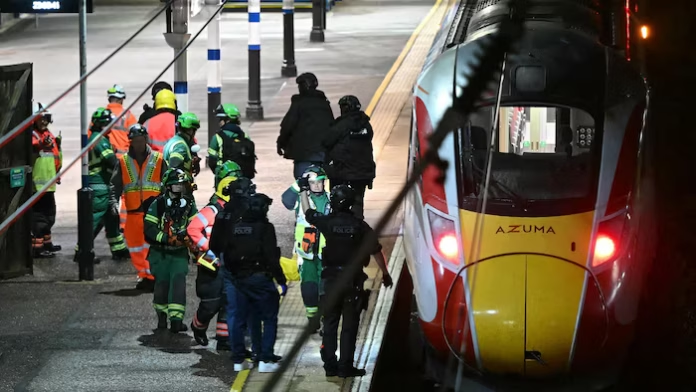Despite ten injuries, including one in critical condition, British police swiftly ruled out terrorism. The Huntingdon incident highlights the steady rise in knife violence across the UK—and the troubling way it’s politically managed and downplayed.
A Brutal Attack, Neatly Sanitised
On Saturday, November 1, 2025, around 7:40 p.m., a train traveling from Doncaster to London King’s Cross became the scene of a shocking knife attack. Near Huntingdon station, about 120 km north of London, an assailant injured ten passengers, one seriously: a railway employee from LNER who tried to intervene, and whose “heroic” behavior was praised by British Transport Police (BTP).
Despite chilling eyewitness accounts—an attacker wielding a large knife, passengers screaming, blood in the aisles, people hiding in toilets, the police quickly shut down any suggestion of a political or ideological motive. “At this stage, there is nothing to suggest this is a terrorist incident,” stated Superintendent John Lovelace in a brief press update.
Only one man, aged 32, is still held as a suspect. The second, 35, was released. Prime Minister Keir Starmer called the incident “deeply concerning,” while King Charles III expressed being “shocked” in a statement on social media.
The Habitual Depoliticisation of Violence
British authorities appear increasingly inclined to downplay incidents that could provoke community tensions or cast doubt on the country’s migration and policing policies. The hasty dismissal of terrorism—as if it were a PR reflex rather than a conclusion drawn from evidence—suggests a deep discomfort with the truth, or at least with its public perception.
Notably, a passenger recounted that the attacker told her: “The devil will not win.” Such a declaration would, in a different context, trigger serious counter-terrorism questions. Yet it was discarded without explanation. No name, no background, no motive: this isn’t an oversigh, it’s a strategy of erasure.
A Quiet Collapse of Public Order
Knife crime in England and Wales has soared over the past fifteen years, despite the country’s strict gun laws. The Home Office admits nearly 60,000 knives have been confiscated or recovered in the last decade alone. And yet each new attack prompts the same script: remorseful statements, calls for resilience, and no real reckoning with the deeper cultural, social, or identity-driven roots of this violence.
Since taking office in July 2024, the Starmer government has made a show of tightening knife laws. But the gap between policy gestures and street-level reality remains vast. The Huntingdon attack comes barely a month after a deadly stabbing at a synagogue in Manchester. That, too, ended in blood and police gunfire.
When Violence Becomes Unmentionable
What is most troubling is not just the frequency of attacks, but how quickly they are absorbed into the political fog. So stripped of meaning, incidents like this knife attack in England are rendered sterile, neither terrorism nor crime, but a vague “incident” managed via pre-formatted statements.
But this was no isolated act. It reflects a slow erosion of national cohesion and order, where the lines between gang violence, communal conflict, and radical ideology blur into silence.



